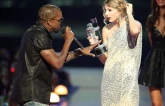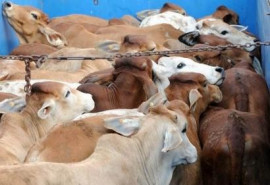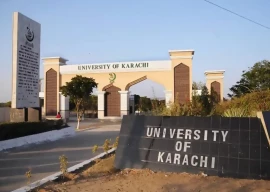
The atmosphere in a sports field tucked away in Hijrat Colony’s narrow lanes was fraught with excitement. While most of Karachi only gets this riled up for a cricket match, the crowd of about a hundred men and countless children had gathered to witness one of the opening rounds of The All Karachi Bacha Khan Makha Tournament 2011 held in Landhi.
Makha is a 5,000 year-old Pakhtun sport played by men in northern towns such as Swabi, Mardan and Buner. It is similar to archery except a lot less dangerous as the arrow-tip is not sharp but a round metal plate. When the sport began, it was a form of training for warfare. The Pakhtun tribes, Pakht and Bakht, used it to train their warriors in archery. When the war times ended, the activity became a sport. It is now very popular among Pakhtun neighbourhoods across the country. Sunday’s match between teams from Hijrat Colony and Keamari began at 6:30 pm and continued till the early hours of the next day.
“We hope to spread it to other areas and ethnicities as well,” said a 50-year-old player, Zalan Yousufzai. “So far the tournament is funded by the players but we would really like the government to start funding us, so that it can be an official sport.”
Snack sellers pounced on the opportunity, lugging their carts into the ground to sell their wares to the audience. Children milled around hoping to catch a glimpse of the grownup action.
“Which team will he be in?!” they giggled, ogling awestruck at the burly men lining up to participate.
Makha is a traditional family sport that boys learn from their fathers. All types of men, from poets to teachers to government employees, turned up to participate. However, as the player must possess enough strength to pull back the six-foot-long bow, the participants are generally within 15 and 60 years of age.
The bow, traditionally made from reindeer antlers, is called bajauri leenda. The original bows, available only in Khyber Pakhtunkhwa, are priced at Rs20,000. They are held together with animal tendons, leather, bamboo and rope. In Karachi’s humid environment, however, these bows only last a few months. Instead the men here use simple bamboo and rubber string bows available for Rs8,000.
Traditionally, the bow itself is supple and the rope is inelastic. When pulled, the bow must be stretched forward. In Karachi’s version of the sport, the rubber string is pulled back.
The arrow is also giant-sized. It is a 6.5-foot bamboo pole called a ghashay. The arrow is edged with an iron plate known as a tubrai and is the same size as the target with a tail of vulture feather. The shooter takes his position at the pan — 32 feet from the target which is referred to as a booth. The circular target or booth is six inches in diameter, surrounded by a plastic ring or kwaara and has a white, wooden mark in the centre called the takai.
The game kicks off with a coin toss and the winner gets to shoot first. Twenty-four teams participate in the Karachi tournament. The game is played between two teams with 12 players each — 10 competitors and two reserves — and a community elder who acts as an arbitrator. Each player shoots twice per round, the group with the most hits on the booth progresses to the next round.
Each time there was a shot on target, the men waiting on standby with dhol (drums) and bajjay (flutes) would erupt into song while the crowd took to their feet to break into dancing. Last year, Fakir Colony was the victor of the tournament and took home a trophy and cash prize.
In 1965, there were two Makha teams in Karachi, now the number has grown to 45. Each area has its own team while the sport is the most popular in Landhi and Old Sabzi Mandi.
On Saturday, Landhi’s ‘Super Sawabi-A Landhi’ took on the ‘Afghan-XI’ from Sabzi Mandi. Afghan-XI won by one point. The ‘Abasin Zarobi-A’ from Keamari have already progressed to the semi-finals. The points received by the Afghan-XI, the Abasin Zarobi-A and the winners of Sunday’s match will be tallied. The one with the most points will go directly to the final on June 21 while the other two will fight it out in the semi-finals on Monday.
Written by Husna Anwar
Published in The Express Tribune, June 20th, 2011.

1727778647-0/diddy-(16)1727778647-0-165x106.webp)
1727777906-0/Tribune-Pic-(16)1727777906-0-165x106.webp)














COMMENTS
Comments are moderated and generally will be posted if they are on-topic and not abusive.
For more information, please see our Comments FAQ